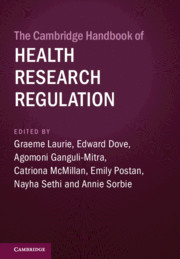Acknowledgements
This volume represents the culmination of many years of work on the Liminal Spaces project, funded by Wellcome under the official title of Confronting the Liminal Spaces of Health Research Regulation (Grant No. WT103360MA). A Senior Investigator Award in Humanities was granted in 2014 to the Principal Investigator, Graeme Laurie, to run a five-year project with the overarching objective to reimagine the human health regulation landscape, building on interdisciplinary perspectives from diverse disciplines such as law, bioethics, anthropology, and sociology. Every member of the editorial team was employed on the project or supported to complete their doctoral studies. Together, we are most grateful to Wellcome for the opportunity to work collaboratively and for the significant capacity building that the project has represented for researchers at various stages of their careers. Our thanks are also due to members of our Advisory Board who deftly steered us on our course – Jonathan Montgomery (Chair), Aidan Courtney, David Porteous, Mark Taylor, Joanna Wardlaw and Heather Widdows.
As to this volume itself, first and foremost, we want to express our gratitude to the contributors who gave of their expertise and time not just to produce their respective chapters but also to engage proactively with us and with each other in a symposium that we were able to host in Edinburgh in April 2019. This event allowed authors to present early versions of their chapters for feedback and discussion; we identified cross-cutting themes through our interactions and collectively co-crafted key messages about how we might reimagine human health research regulation. We are confident that these interactions have helped to make this volume far more than the sum of its parts.
As to the extensive background work that goes into the production of a volume of this kind, special mention must go to Catriona McMillan and Rebecca Richards who have expertly supported the editorial team and all of the authors throughout the writing and production process. Evidence of success in their roles is demonstrated by the fact that this volume was submitted one month ahead of schedule – not a common feat in academia!
Finally, we dedicate this volume to Samuel Taylor-Alexander who was the medical anthropologist on the Liminal Spaces team and held the post of Senior Research Fellow from 2015 to 2017. Sadly, Sam died shortly after taking up a subsequent post at Monash University, but his contributions on liminality and his astute and supportive academic insights were incredibly instrumental in shaping the Liminal Spaces project and all colleagues who have been involved with it. Academia is impoverished by his untimely passing.

